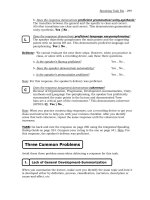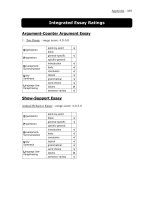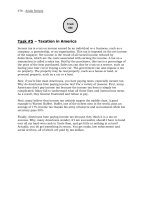Legal and institutional frameworks for urban landholding registration
Bạn đang xem bản rút gọn của tài liệu. Xem và tải ngay bản đầy đủ của tài liệu tại đây (631.9 KB, 74 trang )
Legal and Institutional Frameworks for Urban Landholding
Registration: A Case Study of Addis Ababa
Biruk Tadesse Debela
A Thesis submitted to Addis Ababa University, College of Law and
Governance Studies, School of Law
Presented in Partial Fulfillment of the Requirements for the Degree
of Master in Constitutional and Public Law
Addis Ababa University
Addis Ababa, Ethiopia
June 2017
1
SIGNED APPROVAL SHEET BY THE BOARD OF EXAMINERS
This is to certify that the Thesis prepared by Biruk Tadesse, entitled ―Legal and Institutional
Frame-works for Urban Landholding Registration: A Case Study of Addis Ababa‖, submitted in
partial fulfillment of the requirements for the Degree of Master in Constitutional and Public Law
complies with the rules and regulations of the University and meets the accepted standards with
respect to originality.
Approved by Board of Examiners,
Advisor: Dr. :- Dr. Muradu Abdo
Signature ____________ Date_____________
Examiner__________________________ Signature___________ Date______________
Examiner__________________________ Signature ___________Date_______________
2
DECLARATION
I hereby declare that this Thesis is my original work that has been carried out under the
Supervision of Dr. Muradu Abdo, Associate Professor, of Addis Ababa University, School of
Law, during the year 2017 as part of the Degree of Master in Constitutional and Public Law in
accordance with the rule and regulation of the University. I further declare that this work has not
been submitted to any other University or Institution for the award of any degree or diploma and
all sources of materials used for the thesis have been duly acknowledged.
Biruk Tadesse
Signature_______________________
Date
__________________________
Place and date of submission: School of Law, Addis Ababa University
July, 2017.
3
Abstract
Nowadays, ongoing urbanization along with an increase in population has created a huge
demand for urban land for different uses including residential, greenery, infrastructure, business
and social services. This trend applies to Ethiopia as well as the city of Addis Ababa. However,
there is a problem in identifying who holds what land, where, what size, which land is
government and which one belongs to a private person. These problems hamper the efficiency of
service delivery, planning and decision making. Land registration is considered to contribute to
the solution of such problems.
In the contemporary situation of Ethiopia, in 2011 Government has adopted the Urban Land
Development Management Policy, which have paved ways for the issuance of the Urban
Landholding Registration Proclamation No .818/2014.This research is about legal and
institutional framework for urban landholding registration in the case of Addis Ababa. The
research argues that there are legal, practical and institutional problems in the implementation of
urban land registration law in the city of Addis Ababa.
The findings of the study revealed that, the existence of burdensome provisions which impose a
mandatory obligation on a person to file twice application (for adjudication and registration) and
for having a provision that punishes a person who has made the right application at the right time
due to the failure of other joint holder to submit the application for registration within the time
specified by law, the silence of law towards the issue as to what procedure to be followed to
adjudicate and register land parcels owned by embassies and international organization, and what
the fate of such parcels where transfer of title has occurred in conflict with the law are the legal
problems identified by the research. Besides, weak public participation, lack of public awareness
about the process of land registration, poor cooperation between land registry institution, nonestablishment of a security fund that will be used for the payment of damage caused to third
parties and failure to deliver updated reliable information to clients using the current digital
registration system are some of key identified practical and institutional problems identified and
analyzed under the research. Finally, based on the findings of the study recommendations are
forwarded.
In conducting the study, multiple methods were deployed including a desk review of primary and
secondary materials, in depth interviews and FGD discussions with concerned experts, officials,
surveyors and lawyers from AACGLRIA and Ministry of Urban Development and Housing
(MoUDH).
I
Acknowledgements
Praise the Almighty God, who provides me indescribable support during the present research
work. I am indebted to my advisor Dr. Muradu Abdo, for his ongoing guidance, encouragement,
as well as for the many hours he has invested in reading and offering feedback on the various
drafts of each chapter. I am immensely grateful to him for the patient supervision that he has
provided since the beginning of this research, and the end result has undoubtedly become better
thanks to his help. His complete support and guidance helped me to complete the research work
in its present form.
My appreciation also goes to my interviewees for taking the time to meet with me (their
names are all listed in the appendix); The Thesis would have been greatly diminished without the
many insightful comments they furnished me. In particular though, Ato Behanu Wedajo, Hassen
Mossa, Biniyam Aserat (benjajawu), Adiss Tamir, Abebe Alemu and Mahlet Shewangizawu of
AACGLRIA were most invaluable in this regard.
Finally, I would also like to express my heartfelt appreciation to my mom; Dr. Asselfech Tadesse
(Enate). My beloved uncle, Getachewu Tadesse, my wife, W/ro Meaza Mekonen, and all the
other members of my family deserve special appreciation for their love, understanding and
support.
II
Table of Contents
Declaration
Signature page
Abstract
Acknowledgments
Table of Contents
Acronyms and abbreviations
1. Chapter One: Introduction...............……………………………………………………...….1
1.1 Background of the study…..…………………………………………………………………..1
1.2 Research questions…………………………………………………………………………….4
1.3 Objective of the study………………………………………………………………………....4
1.4 Significance of the study………………………………………………………………………5
1.5 Scope of the study…………………………………………………………………………......5
1.6 Methodology…………………………………………………………………………………..5
1.7 Organization …………………………………………………………………………………..6
2. Chapter two: General Overview of Land Registration……………………………………7
Introduction …………………………………………………………………………………...7
2.1 Land Registration Defined and Historical Over View ………………………………………..7
2.2 Why land registration is necessary? ...………………………………………………………...8
2.3 Conditions Essential for Success of Land Registration ……………………………………..10
2.4 Types of Land Registration...………………………………………………………………...11
2.5 Purposes of Land Registration...………………………………………………………….....12
2.6 Disadvantages of Land Registration ...………………………………………………………18
2.7 Legal and Organizational Aspects of Land Registration ………………………………......19
2.8 Major Principles of Land Registration and the Need for-Good governance...………………21
2.9 The Best Practice of Land Registration:-Cases of Sweden and Netherlands………………..24
2.9.1 Sweden……………………………………………………………………………..25
2.9.2 The Netherlands..………………………………………………………….…….....26
2.10
Summary..……………………………………………………………………………......28
III
3. Chapter Three: Urban Landholding Registration in Ethiopia ……………………..…..29
Introduction……………………………………………………………………………….…..29
3.1 Urban Land Holding Policy Development in Ethiopia………………………………………29
3.1.1
Pre-1974 Urban Land Policy ……………………………….……………….29
3.1.2
Urban Land Reform of the Derg Regime ……………………………….......32
3.1.3
Current Urban Land Policy………………………………………………….34
3.2 Overall Assessment of the Urban Landholding Registration Laws…………………............36
3.2.1
Principles of Urban Land Registration………………………………............38
3.2.2
Institutional Framework of the urban Land Registry Law …………………..39
3.2.2.1 The Federal and Regional Land Registry Institution…………………....40
3.2.2.2 Other Institutions ………………………………………………………..42
3.3 The Current legal and Institutional Status of Urban Land Registration in Addis Ababa...….43
3.4 Legal and Practical Problems of the Urban Land Registration Law...………………………46
3.4.1
Legal Problems of Urban Land Registration Law...…………………………47
3.4.1.1 Burdensome Provisions of the Law...……………………………………47
3.4.1.2 Gaps of the Law ...……………………………………………………….49
3.4.1.3 Conflicting Provisions of the Law.. ……………………………………..51
3.4.2
Practical Problems of the Urban Land Registration Law...………………….51
3.4.2.1 Reliability of Registered Urban Land Information. ……………………..51
3.4.2.2 Accountability and Transparency..………………………………………52
3.4.2.3 Poor Institutional Integration and Competence...………………………..52
A. Poor Institutional Integration.…………………………………....52
B. Institutional Competence……………………………………..….53
C. Poor Public Participation …………………………………….….54
3.5 Summary………………………………………………………………………………….….55
IV
4. Chapter Four: Conclusions and Recommendations ….…………………………….……57
4.1 Conclusions……………………………………………………………………………...57
4.2 Recommendations ……………………………………………………………………...60
Bibliography….……………………………………………………………………………........63
Annexes
Annex 1: Fiscal year 2008 E.C report of AACGLRIA
Annex 2: Document that shows the list of the transfer of title conducted by kollfe and Nifas Silk
Lafto sub city offices of TATSPO
Annex 3: Interview and focus group discussion guides
V
List of Acronyms
AACGLRIA
AA-LIS
Addis Ababa City Government Landholding Registration and Information
Addis Ababa Land Information System Agency.
EPDRF
Ethiopian People‘s Democratic Revolutionary Front
FDRE
Federal Democratic Republic of Ethiopia
FGD –
Focus Group Discussion
IPRIA
Immovable Property Registration and Information Agency
MoUDH
Ministry of Urban Development and Housing
TATSPO
Title Administration Transitional Period Service Project Office
VI
Chapter One
Introduction
1.1 Back Ground
Land registration plays an important role for social, political and economic development of
one country, as long as it functions well and fulfills the goals set by the society and the
government. Although different countries and experts have different opinions on the issue,
the following descriptions of land registration and cadaster, including the strong relation
between them are generally accepted.
Land registration is a process of official recording of rights in land through deeds or title (on
properties). It means that there is an official record (the land register) of rights on land or of
deeds concerning changes in the legal situation of defined units of land. It gives an answer to
the question ―who‖ and ―how‖ they owns/possess the land.1
Cadaster is a methodically arranged public inventory of data concerning properties within a
certain country or district (region), based on a survey of their boundaries. Such properties are
systematically identified by means of some separate designation. The outlines or boundaries
of the property and the parcel identifier are normally shown on large scale maps which,
together with registers, may show for each separate property the nature, size, value and legal
rights associated with the parcel. It gives an answer to the questions ―where‖ and ―how
much‖ the land is. 2
Legal cadastre: - is an updated landholding information system containing a record of the
right, restrictions and responsibilities on a defined legal boundary for each land holdings
demarcated as per urban land holding adjudication and registration parcel on map.3
A Cadaster is normally a parcel based, and up-to-date land information system containing a
record of interests in land (e.g., rights, restrictions and responsibilities). It usually includes a
geometric description of land parcels linked to other records describing the nature of the
interests, the ownership or control of those interests, and often the value of the parcel and its
1
JaapZevenbergen(2004)‘‘A Systems Approach to Land Registration and Cadastre‖, Nordic Journal of Surveying
and Real Estate Research.vol 1, PP 1
2
3
Ibid, pp1-2.( emphasis is added on the last part of the phrase )
Art 2(5) ,Urban landholding registration proclamation , no 818/2014,
1
improvements. It may be established for fiscal purposes (e.g. valuation and equitable
taxation), legal purposes (conveyancing), to assist in the management of land and land use
(e.g. for planning and other administrative purposes), and enables sustainable development
and environmental protection.
Land registration is a complex process which involves at least technical, legal and
organizational aspect which influences each other .All these aspect are involved in making a
system of land administration function well. It will not come as a surprise that numerous
countries do not have such a well-functioning system of land registration. It is not easy to
operate an effective system of land registration in a country.4
When we look into Ethiopian legislation on immovable registration,we find the Civil Code.
Though never come into force, the fundamental legislation on real property registration is the
section of the Civil Code that deals with immovable property registration. One title, Title X,
is devoted to this purpose and is entitled as ―Registers of Immovable Property‖. The title
includes 93 articles governing this important area of high economic significance. These
provisions are contained in 4 chapters. The Code does not provide different chapters or
sections for cadastre and land register; it regulates cadastre and land registration in a unified
approach. It is of particular importance to mention that the title on register of immovable‘s is
not yet applicable as its operation has been suspended. There are also applicable provisions
relating to registration of property (Arts 1567-Art 1571), Register of Mortgages (Arts 1573,
1574), Register of Immovable (Arts 1575, 1576) and Register of Owners (Arts 1583Art1585). Urban Landholding Registration Proclamation No 818/2014, Urban Landholding
Adjudication and Registration Regulation No 324/2014, and Urban Landholding
Adjudication and Registration Directive No 45/2014 which this research study particularly
focus is the other Legislations that is enacted to establish an effective urban land registration
system in Ethiopia.
Consequently the above stated facts made clear that land registration is about ‗the process of
recording‘ the previously described interests. This recording process involves people and
4
JaapZevenbergen (2002)‖ Systems of Land Registration Aspects and Effects (NCG
NederlandseCommissievoorGeodesie , Netherlands Geodetic Commission), pp 4.
2
instruments, brought together in organizations. Virtually every society which undertakes land
registration has more than one organization involved in the recording process, which is
divided into many tasks. Accordingly, when we look into the existing legal and institutional
arrangement for Urban Land registration pursuant to Urban Landholding Registration
proclamation No, 818/2014,the registration takes place within institutions established at state
level. On the other hand at federal level it is the Ministry of Urban Development and
Housing (MoUDH ) who is given a power to follow up and ensure the proper implementation
of this proclamation and its following regulations, directives and standards all over the
regions and cause corrective measures to be taken where problems exist.
These registry institutions of regional sates are expected to meet some standards (values)
emanating from the law. To mention some the registry institution expects to establish
transparent and accountable working system, to make registration of possession open to
public,5 to take due care to safeguard the legal caster registered information kept on paper or
in digital form from security risk6 and to establish a land registry system compatible with the
rural land administration which supports the building of one economic community.7
Accordingly, when we see an Addis Ababa city administration current existence, the city
administration has established Landholding Registration and Information Agency to
undertake the land registration of the city. However, this institution unless it is said to be at
the preliminary level, it lack to meet some of those standards listed above for one registry
institution need to hold. On the other hand, from the legal point of view, this urban
landholding registration legislation itself has some contradictory and burdensome provisions.
Thus, it has paramount importance to identify the problems or the gaps that equate a problem
brought land registration system and recommend the solutions. Besides, in the current
situation of our country where foreign and domestic investor‘s investment on land is highly
increasing, it is prudent to rectify the existing problems surrounding the land registration
especially in the city of Addis Ababa which these research papers mainly focus. This would
help the city to accommodate more investors and earn the income that will contribute much
for the economic prosperity of the city and our country.
5
Supra note 3, Art 36.
Ibid, Art 31(3).
7
ibid Art 4(1)( emphasis is added)
6
3
In general, land registration is so important for a social, political and economic development
of a country; the same importance, no doubt, can be claimed in relation to Ethiopia. But the
land registration system of Ethiopia is replete with a number of problems associated with its
legal regime, institutional framework and practice as well. A system of land registration has
to achieve its goals to be functioning well. To determine this it has to be analyzed to see if it
is fulfilling the functions needed to achieve its goals in a satisfactory way. Since this study
concentrates on the goal of urban land registration in providing legal security to the
owner/possessor and purchaser, that goal has to be achieved well. Hence this study will
mainly emphasize on the legal and practical problem related to legal cadastre registration in
Addis Ababa.
1.2 Research questions
The study addresses the following questions.
What are the purposes of urban landholding? And to what extent can those be
materialized?
What are the major legal and practical problems related to urban landholding
registrations?
What are the major problems associated with registry institutions?
1.3 Objectives of the research
The research has the following general and specific objectives.
1.3.1
General Objective
The general objective of this research was to assess the Legal and Institutional Frame work for
Urban Landholding Registration using Addis Ababa as a case study and also to provide
recommendations.
1.3.2
Specific Objective
The specific objectives are the following:
To identify and critically analyse gaps and other issues with regards to laws
governing urban land registration.
4
To assess the institutional arrangements and coordination of registry institutions
To evaluate and discuss practical problems encountered in the enforcement of
normative aspects of urban landholding registration and
Provide recommendations with regard to the issues examined in the Thesis.
1.4 Significance of the study
The study was focused on the problem of urban land registration. Hence it may hopefully
contribute to the forthcoming amendment of the Urban Landholding Registration
Proclamation No 818/2006 with respect to problems at hand. It will also have a certain
contribution for the legislative body, the judges and lawyers in creating awareness and for
those who are interested to invest in the area of real-estate. The study will also serve as a
basis and may call the attention of those who want to conduct research in the field. Finally, it
may serve as a reference material in the academic sphere.
1.5 Scope of the study
The whole study was concerned with the major problems of urban land registration in Addis
Ababa. However, though not in detail the study has also included multipurpose and physical
cadastre registration system for the purpose of clarifying the similarities and the distinction
between legal cadastre and other cadaster registration systems. In addition, the nature and
characteristics of urban land registration from some selected countries will be dealt for the
purpose of comparison. As far as the geographical limit of the study was concerned
information were collected from the Ministry of Urban Development and Housing (MoUDH)
and Addis Ababa City Administration land holding Registration and Information Agency.
1.6 Methodology
The method emphasized in the investigation of the characteristics of land registration based
on the Urban Landholding Proclamation No 818/2006, Urban Landholding Adjudication and
Registration Regulation No 324/2014 and the following directive. Sample study land
registered in Addis Ababa City Administration land holding Registration and Information
Agency was considered .In the study both qualitative and quantitative methods were
employed. The study is qualitative in a sense that it devoted to the reasons, justification or
logical argument on legal provisions and decided court cases if it exists. Case would be
5
the
analyzed so as to show the practical problem of the land registration system at hand. It is
quantitative because the study was depended on certain data, report and information collected
from the Ministry of Urban Development and Housing (MoUDH ) and Addis Ababa City
Administration Land Holding Registration and Information Agency.
Data was collected from primary and secondary sources. Primary data were gathered mainly
through interviews and focus group discussion. Moreover, the method of sampling technique
used to conduct interviews and focus group discussion was also be purposive sampling
technique in order to gather relevant information‘s easily which are essential to the research
and to create conducive atmosphere to my research. The secondary sources are laws,
domestic, and foreign literature related with the study.
1.7 Organization of the Study
The research has four chapters having sub sections and structured as follows. Succeeding this
introduction chapter, chapter two highlights to discuss issues that helps to understand the general
concept, purpose and principle of land registration in general. The chapter also briefly discusses
definition of land registration, main purposes of land registration and timing of establishment of
formal land registration system, type of land registration, conditions for successful land
registration and the legal and organizational aspects of land registration. Furthermore, the chapter
considers principles of land registration and good practices of countries based on the lessons
drawn from Sweden and the Netherlands.
On the other hand chapter three discuss land registration in the context of Ethiopia through
critically analyzing legal and institutional framework under the current urban land registration
law and its practical implementation in the case of Addis Ababa .Consequently, throughout the
chapter urban land policy development of Ethiopia, the overall assessment of the urban
landholding registration laws, principles of urban land registration, institutional framework of the
urban land registry law, the current legal and institutional status of urban land registration in
Addis Ababa and legal and practical problems of the urban land registration law are discussed in
detail respectively. Finally, chapter four presents the concluding remarks and ways forwarded.
6
CHAPTER TWO
General Overview of Land Registration
Introduction
This chapter aims to discuss issues that help to understand the general concept, principles and
purpose of land registration. Accordingly, the discussion covers the definition of land
registration, the main purposes of land registration and timing of establishment of formal land
registration system, type of land registration, conditions for successful land registration and the
legal and organizational aspects of land registration. Furthermore, the chapter considers
principles of land registration and good practices of countries based on the lessons drawn from
Sweden and the Netherlands. The chapter ends with a summary.
2.1 Land Registration Defined and Historical Over View
One cannot speak about the registration of land,leaving undefined the subject matter of
registration, since such an attempt would have no practical point of reference. Although there
appears to be no universal definition of what exactly falls under land registration, and what does
not, according to JaapZevenbergen land registration can be described as, ―a process of official
recording of rights in land through deeds or title (on properties). It means that there is an official
record (the land register) of rights on land or of deeds concerning changes in the legal situation
of defined units of land. It gives an answer to the question ―who‖ and ―how‖.‖ 8It in other words
connote, a public system of records concerning legal rights to land.
As far as the historical aspects of immovable (land) registration are concerned, land tenure and
title featured prominently in early agricultural economies. Contracts entered into as early as the
third millennium B.C. demonstrated that people needed tenure security in the land they cleared. 9
The Bible tells of an early land transaction in the book of Jeremiah. In 587 B.C. Jeremiah bought
his cousin Hanameels's field in a purchase of land that involved a sealed deed prepared in
accordance with legal requirements.10
Although early efforts to establish comprehensive land records systems in Europe were mainly
8
.JaapZevenbergen(2004)‘‘A Systems Approach to Land Registration and Cadastre‖,Nordic Journal of Surveying
and Real Estate Research.vol 1, PP 1
9
.Tim Hanstad,‖ Designing Land Registration Systems for Developing Countries‘‘, American University
International Law Review 13, no. 3 (1998): pp 650 paragraph 2.
10
. See Holly Bible Jeremiah 32:9-12.
7
for purposes of public taxation, there were also private needs for land records to facilitate
effective land transfers. It was the need for land records that eventually provided the impetus for
land registration systems.
It can be understood from the aforementioned illustration of the historical development of land
registration that the existence of systems of land registration is often explained through an
elaborate historic overview of its development. This historical development can by and large be
seen parallel to the development of a more and more open immovable (land) market within a
country. It is not so much the historical order of events that is important, but the functions
society needed from the system of land registration in a more and more mature land market that
set the pace
2.2 Why land registration is necessary?
Most scholars agree that Land registration plays an important role for social, political and
economic development of one country, as long as it functions well and fulfills the goals set by
the society and the government. Land is a fundamental resource that is most effectively used and
exchanged when the rights to land are registered.11Thus designing a land registration system
requires a comprehensive analysis of why land registration is necessary.
Accordingly, before addressing the issues of whether and when to establish a land registration
system, government officials should understand the preconditions for a land registration system,
the potential advantages and disadvantages of such a system.
Handstad argues that the following circumstances in a developing country indicate that a formal
land registration system is desirable and such conditions that must present if such registration is
to be successful.
a) Where land title insecurity, uncertainty, or inadequacy restrains development:
Though tenure security and land title security are related, they are not synonymous. A
landholder has security of tenure if she perceives little or no likelihood of losing
physical possession of the land within some future time period. Security of tenure, a
question of fact, exists without documentary evidence. Security of title exists if the
11
.supra note 9,pp 652 second paragraph
8
landowner is secure in her legal possession of the land. Security of title cannot exist
without documentary evidence.12
When landholders have insecure tenure they are unlikely to make the long-term
investments needed to enhance economic development. Landholders need confidence
in the future, which public policy provides through landholding title registration.
b) Where there is early development of a market in land
A market for private land rights will develop in any society that recognizes such
rights. In such a society, land interests will pass by inheritance. Both sale and
inheritance are likely to be more active under conditions of expanding population.
Economists point to the importance of a market in land as a factor in production if
latent energy is to be released and productive potentials realized. Thus, it becomes
important to provide adequate and efficient machinery to safely transfer interests in
land 13
c) Where there is a high incidence of disputes concerning land
Uncertainties over the nature of land interests and over the position of ill-defined
boundaries are a fruitful source of disputes in many developing countries. Litigating
such disputes leads to a significant expenditure of time, capital, and scarce
administrative resources. Land registration effectively reduces this waste of
resources.14
d) Where there is a need to establish a credit base
The permanent improvement of land and other land related investment depend on the
extension of credit. Money Lending institutions are typically unwilling to extend
credit, if landholders and immovable property owners do not have well-defined and
documented land rights to offer as collateral. In many less-developed countries, the
absence of secure title registration has been an obstacle for accessing credit.15
Likewise, efforts to provide housing can be hampered if those seeking housing cannot
offer documented land rights as collateral for a housing loan.
12
. Id ,pp 653 third paragraph
. id,pp, 654
14
. ibid
15
Id, pp 655 first paragraph.
13
9
e)
Where a redistributive land reform is contemplated
If land reform measures are to be implemented, records of land rights provide
significant assistance for that task. Important land reform implementation decisions,
such as from whom land is taken and to whom it is given, are facilitated by the type
of information contained in a landholding registration system.16 The system also helps
provide secure land titles to land reform beneficiaries.
2.3 Conditions Essential for Success of Land Registration
Tim Handstad further states that there are also other conditions that must exist before such
systems are likely to meet with success.17 These are:
a) Landholders and others must generally understand and support the system's
introduction
The demand for land registration should be generated from within and outsiders
should not impose the system on a reluctant landholding community. To this extent, it
is important to assess user needs before designing the registration system. Public
education about immovable registration both facilitates and supports an
understanding of the system.
b) Government must appreciate the expense and duration of the operation
Land registration is essentially a long-term investment; therefore, policy makers must
understand that there are few immediate benefits. Although the government's costs
are reduced after the initial compilation stage, subsequent maintenance of the register
is a permanent commitment. A policy vacillating between lukewarm support and
neglect will prove more costly in the long run. If land registration cannot be
conducted efficiently and continuously, it is probably better left alone.
c) Property rights and property boundaries must be clearly recognizable and definable
Property rights vested in claimants and the boundaries delimiting the extent of their
holdings must be quickly recognizable and clearly definable if the introduction of a
land registration system is not to be frustrated by endless dispute. Land registration
16
17
. Id, second paragraph.
Supera note 9, Tim Handstad,pp,655-657
10
should not be employed to create interest, but to record and confirm existing interests
and definable future interests. Physical demarcation of boundaries by hedges, fences,
decks, etc. can greatly assist the process and reduce the costs.
d) Qualified survey and registry staff must be available
Compilation and maintenance of a land registration system depend heavily on
competent staff. Although education and training can fulfill a significant portion of
this need, an existing core of qualified professionals is vital to begin the process and
to assist in the training effort.
In developing countries, where there is usually a shortage of professional and
technical staff to meet the day-to-day needs of most government departments, it must
be realized that the land registration system competes with other government
departments for the inadequate supply of educated personnel.
e) A developed system of property rights must exist
Before land registration can be successful, there must be a developed system of
property rights. Land registration systems register legal rights in land. If such rights
are ambiguous, non-existent, or poorly defined by law, registration of those rights is
likely to be an expensive and wasteful exercise. Such countries should focus their
initial efforts on defining property rights, perhaps in a comprehensive land law.
2.4 Type of Land Registration
There are two categories of land registration systems exist: registration of deeds and registration
of title.18
Registration of deeds developed first. This system, called "land recordation" in the United
States, involves registering or recording of documents affecting interests in land. It developed
hundreds of years ago in several European countries to prevent double selling of land. With
registration or recordation of the deeds at a government office, the priority of claims could be
established in the event of double selling.
The second system is registration of title. This system was first introduced in Australia, in
1858, by Sir Robert Torrens.' Torrens believed that a land register should show the actual state of
18
. Supra note 9 ,pp 650-661
11
ownership, rather than just provide evidence of ownership." Under this system, the government
guaranteed all rights shown in the land register. Shortly after Torrens introduced the concept of
title registration in Australia, a similar system developed in England.'19
According to JaapZevenbergen(2002)‖ this two type of registration type are defined in the
following way
Title registration: - title registration system means that not the deed, describing e.g. the transfer
of rights is registered but the legal consequence of that transaction i.e. the right itself (= title). So
the right itself together with the name of the rightful claimant and the object of that right with its
restrictions and charges are registered. With this registration the title or right is created.20
Deed registration: - A deed registration system means that the deed itself, being a document
which describes an isolated transaction, is registered. This deed is evidence that a particular
transaction took place, but it is in principle not in itself proof of the legal rights of the involved
parties and, consequently, it is not evidence of its legality. Thus ,before any dealing can be safely
effectuated, the ostensible owner must trace his ownership back to a good root of title.21
In general legally speaking the most elementary difference is that ―deed registration is concerned
with the registration of the legal fact itself and title registration with the legal consequence of that
fact.
2.5 Purposes of Land Registration
Introduction of a formal landholding registration entails considerable costs. It is of great
importance, especially in capital-poor developing countries, to give priority only to sound
investments. Hence, the advantages of landholding registration should be carefully studied. The
advantages depend on the prevailing conditions in the subject country and the type of
landholding registration system to be established. Some of the general purposes of land
registration conversed by different scholar in the field are discussed below.
19
id,pp,651
. JaapZevenbergen(2002)‖ Systems of Land Registration Aspects and Effects (NCG
NederlandseCommissievoorGeodesie, Netherlands Geodetic Commission), pp62
21
.Ibid
20
12
According to Susan.Nichols, though the specific objectives of land registration can differ from
jurisdiction to jurisdiction, the following purposes are common to all land registration
arrangements.
1. Notice: registration provides constructive notice of the land of land tenure interests,
where by a person through inquiry in official public records or registers can find evidence
that such interest exists.22
2. Validation:-land registration is an official process which establishes an evidence of
interest in land. Public validation ranges from a rudimentary check that documents being
filed or registered meet the basic criteria such as plan size, signature, seals to a more
rigorous examination and certification of the content of the document, a plan, or the title
of the registers itself. 23
3. Monitoring and Enforcement: - a third function of land registration is monitoring land
transaction and enforcing the laws and regulation affecting land tenure.24
4. Revenue:-public revenue in the form of land registration or other taxes, and fees for
registration, information services (e.g. Certified searches) is collected through the
registration process.25
5. Management of land tenure information :-from an information perspective, this is the
primary function of land registration and how well the other function are carried out
depends on the quality of management agreements.(e.g. For the collection of taxes there
must be a means of identifying who must pay and how much)26
2.5.1 Land Registration a Means to Convert Asset into Active Capital
Hernando De Soto, views land registration or formal property registration system as the practice
that the west (developed nations) has been using for so money long period of time as a hidden
means to convert asset into active capital. When Desoto discusses this issue very briefly, he
starts by raising the following central questions.
“This may sound too simple or too complex. But consider whether it is possible for assets
to be used productively if they do not belong to something or someone. Where do we
22
Nichols, S.E (1993).Land Registration: Managing Information for Land Administration. Ph.D. dissertation
,Department of Surveying Engineering Technical Report no,168,University of New Brunswick, Fredericton, New
Brunswick,Canada,340,pp 133
23
Ibid
24
Ibid,pp,134
25
Ibid
26
Ibid ,pp,135
13
confirm the existence of these assets and the transactions that transform them and raise
their productivity if not in the context of a formal property system? Where do we record
the relevant economic features of assets if not in the records and titles that formal
property systems provide? Where are the codes of conduct that govern the use and
transfer of assets if not in the framework of formal property systems? It is formal
property that provides the process, the forms and the rules that fix assets in a condition
that allows us to realize them as active capital….”27
Furthermore Desoto proclaims that
“…In the West, this formal property system begins to process assets into capital by
describing and organizing the most economically and socially useful aspects about
assets, preserving this information in a recording system - as insertions in a written
ledger or a blip on a computer disk and then embodying them in a title. A set of detailed
and precise legal rules govern this entire process. Formal property records and titles
thus represent our shared concept of what is economically meaningful about any asset.
They capture and organize all the relevant information required to conceptualize the
potential value of an asset and so allow us to control it. Property is the realm where we
identify and explore assets, combine them and link them to other assets. The formal
property system is capital's hydroelectric plant. This is the place where capital is born.
”28
In short, according to De Soto, unless the property is registered in a formal property registration
system it is extremely difficult to move such property into the market. This is because that any
transaction require an enormous effort to determine basic information (right, restriction and
responsibilities) about the property.
On the other hand scholars like Tim Handstadstates that the following are the main purposes or
advantages of land registration.
a) Greater Tenure Security
Land rights in developing countries are often very obscure. Two situations exist, in
particular, where land rights are likely to lack specificity and certainty. First, in countries
with a significant degree of customary land rights, discrepancies often exist between
unwritten customary rules and newer foreign concepts that cause uncertainty about land
ownership and other rights. Second, in the numerous countries that are making the shift
from state or other public ownership of land to private land ownership, the transition
creates considerable uncertainty concerning land rights. Land registration provides a
27
Hernando De se Soto,(2001) ―The Mystery of Capital: WHY CAPITALISM TRIUMPHS IN THE WEST AND
FAILS EVERYWHERE ELSE” pp.44
28
Ibid,pp,44-45
14
degree of certainty and security to the owner as well as to others having rights in land.
Such secure rights are particularly important for agricultural land. Economists and others
have long argued that increasing security of individual property rights in land stimulates
private investment and economic development because the individual is more willing to
make long-term improvements. To the extent that landholding registration improves
tenure security, one would expect it to increase productivity-enhancing investment.29
b) Greater Access to Credit
The registration of rights to land establishes those rights in the eyes of the law and
provides documentary evidence necessary to prove land rights. The holder of the land
rights thereby becomes "creditworthy" and can pledge his land rights as security for a
loan. Development of land and an efficient agriculture typically requires more
resources than the owners command on the market or can borrow from friends or
relatives. Mortgagees may rely on the register. Their risk is reduced, thus lowering
the interest rate they charge for the loan.30
c) Dealings in Land More Expeditious, Reliable, and Inexpensive
Without reliable land registers, land transactions may be expensive, time consuming,
and ineffective. It is normally necessary to establish that the reputed owner actually
has the legal right to alienate the property. This process may be complicated or
confusing for the lay person. In many countries that lack a land register, property
owners use legal experts to conduct title searches and to establish ownership. The
costs are often considerable. A land registry not only makes extended searches of land
rights unnecessary, but also makes it possible to use simpler, standard forms of
conveyance. A formal land registry aids small rural landholders, who often cannot
bear the cost of professional conveyancing assistance.31
d) Establishment of a Land Market
One difficulty facing many developing countries and former centrally- planned
economies is the absence of a functioning land market. The reasons may be extreme
29
Tim Hanstad,‖ Designing Land Registration Systems for Developing Countries‘‘, American University
International Law Review 13, no. 3 (1998): pp 657 last paragraph
30
Ibid ,pp,659
31
Ibid, pp, 660.
15
procedural difficulties in transferring land, lack of land market information, unclear
delimitation of individual and group rights, insecure ownership, and so on. A land
registration system can remove such obstacles and stimulate a land market. The
necessity for a functioning land market will become increasingly apparent as the
society is transformed into a market economy. A functioning land market permits
economies to use land more appropriately, ease the eventual migration of labor out of
the agricultural sector, and generally facilitate the establishment of efficient and
consistent land policies.32
e) Improvement of Land Administration and Public Administration
Because land is an important resource for every country and community, land
administration is a very important function. It is almost self-evident that to plan land
development, one must know the basic facts concerning the land. Better land use is
encouraged through planning regulations. Such improved land use can occur through
direct action like zoning, protection of ecologically sensitive areas, public urban
development, land consolidation, irrigation projects, etc. But it can also be achieved
indirectly by providing the suitable conditions for private development mentioned
above, such as tenure security and access to credit. Land records based on welldefined land parcels are essential for all these purposes. 33
Other public land policy measures, in particular agrarian reform, are facilitated by
land records of defined land parcels. Agrarian reform laws are difficult or impossible
to implement when precise information concerning land tenure is not available.
Virtually every agrarian reform will encounter strong opposition. The absence of a
land register would increase loopholes available to reform opponents and slow the
implementation of effective reform. Other land policy measures such as control of
excessive fragmentation, control of foreign ownership, and prohibitions on excessive
land ownership, even in the absence of an agrarian reform program, will be very
difficult or impossible to implement without the type of organized information
provided by a land registration system.
32
33
Ibid,pp,661
ibid
16









